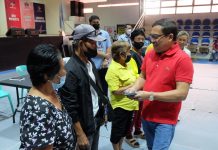To ensure better yield and higher rate of survival for seedlings prepared in its own nursery, Sagittarius Mines, Inc. (SMI) is employing the “elevated seedling hardening” for the seedlings they distribute to communities in South Cotabato.
Elevated hardening is a leading-edge practice in seedling care developed through a joint study by the Australian Centre for International Agricultural Research (ACIAR) at the University of Queensland and the College of Forestry and Natural Resources at the Visayas State University.
For the people of South Cotabato, seedling survival of trees and other plants has always been a concern. Poorly cultivated seedlings produce low quality trees that tend to wither and die when exposed to adverse conditions despite proper planting and maintenance of the plantation area. High quality seedlings, on the other hand, facilitate high survival rates of trees and decreased maintenance costs of tree plantations.
Efren Sarmiento, Environment Officer for Sustainable Development under the Biodiversity Resource Management section of SMI, explained that the SMI Core Farm Nursery shifted from traditional hardening methods to the elevated seedling hardening to ensure survival rate.
According to Sarmiento, this technology also involves the use of what is called J-rooting, which is described as root deformation characterized by the curling of roots (usually in the shape of the letter “j”, hence the term). Seedlings that had j-roots normally grow into trees that are susceptible to uprooting. Trees that grew from seedlings produced from elevated hardening beds, on the other hand, are hardier and resistant to uprooting.
Another advantage of utilizing elevated hardening beds is the prevention of moisture absorption from the ground which, in turn, prevents the growth of long taproots. Lifting, a necessary step in traditional hardening, is a process wherein seedlings are extracted from the ground for transplanting. This method significantly stresses seedlings because it necessitates the pruning of these long taproots. With elevated hardening, the need for lifting is removed thereby sparing the seedlings from the unnecessary stress.
Likewise, in terms of production costs, elevated hardening is more cost-efficient because extraneous steps in the production, such as lifting and pruning, are eliminated. Standardized elevated hardening beds also facilitate easier accounting of seedlings, further streamlining the production process. This increased efficiency has substantially increased the seedling production capacity of the company’s Liberty Core Farm Nursery. For this year, the nursery plans to produce 80,000 seedlings using elevated hardening beds. This number is a substantial increase from the 28,770 seedlings produced last year.
In terms of flexibility, Sarmiento remarked that any type of seedling can be hardened-off using elevated beds. Thus, all the 69 endemic trees (65 of which are high-value crop trees) that are planned for planting around the buffer and project areas will come from hardened seedlings from elevated beds.
When asked about SMI’s plans for this technology, Sarmiento beamed with pride. In line with SMI’s business principles and core values of “delivering industry-leading returns for shareholders” and forming genuine partnerships with local communities and stakeholders, Sarmiento revealed that the Core Farm Nursery plans to “impart this [knowledge] later on to the community because of our plan to plant 4.5 million seedlings within the buffer zone and the project area.”
Current beneficiaries of this knowledge transfer program are local community private operators of seedling nurseries. Sarmiento further added that “we have already conducted two training sessions with the community on how to produce quality seedlings [using the elevated hardening beds]. We had one training session in Tampakan with 30 trainee participants, and another in the Kiblawan Nursery with 30 participants.”






